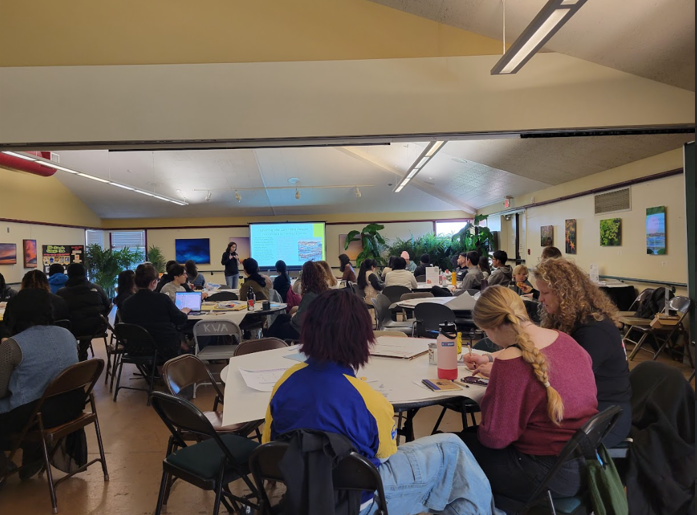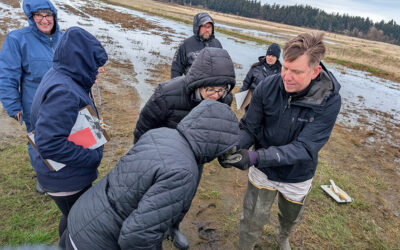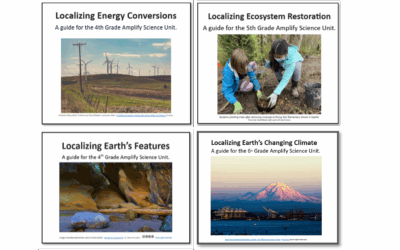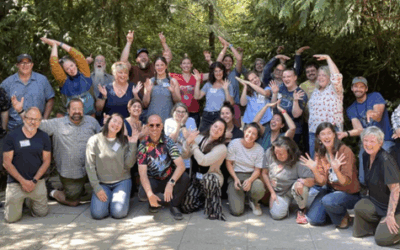In the face of escalating climate and sociopolitical challenges, the Community Education in Action program promotes collaborative learning, bringing together diverse voices to bring communities together and co-create educational resources that address climate and environmental justice. This initiative, designed as a series of interactive workshops—both virtual and in-person—fosters meaningful dialogue between community-based organizations, educators, youth, and advocates, all working within the Just Transition framework to envision and implement inclusive climate solutions.
This past year, Front and Centered partnered with ClimeTime and various community organizations, including Africans on the Eastside, the Asian Pacific Islander Coalition of Yakima, the Community Health Worker Coalition for Migrants and Refugees, EarthCorps, Islandwood, Kitsap Black Student Union, Pacific Education Institute, Puget Sound Educational Service District, the Urban League of Metropolitan Seattle, the UW Institute for Science + Math Education, and Educational Service District 123. Together, we designed a multi-faceted learning experience featuring three virtual workshops (October–December 2024) and two in-person, intergenerational workshops (March 2025 in Pasco and Tacoma). To ensure accessibility, all sessions were conducted in English with simultaneous Spanish interpretation, with bilingual resources available.
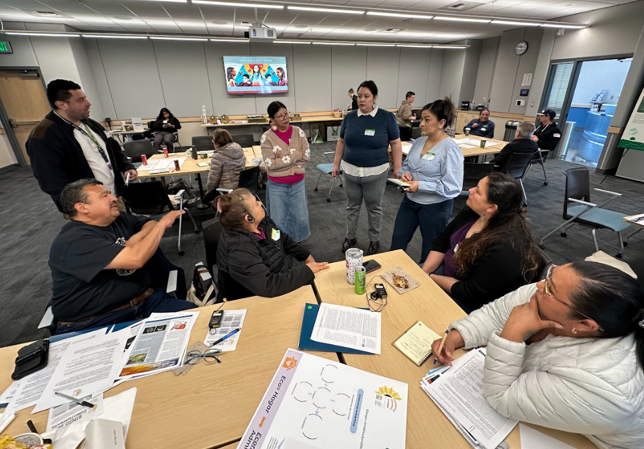
Workshop in Pasco, ESD123. Photo by Oswaldo Wong
The virtual workshops served as foundational learning sessions covering:
- Understanding Climate Change Through a Just Transition
- Exploring Community, Ecological, and Climate Resilience
- Principles of Co-design in Learning Resource Development
These sessions were recorded and supplemented with additional resources, ensuring that participants could engage with the material at their own pace.
For the in-person workshops, Front and Centered collaborated with the Social Justice Film Festival and the Center for Story-based Strategy, integrating storytelling as a tool for social change. Through this approach, participants not only examined the systemic causes of climate change but also explored pathways for collective action. Utilizing artivism—activism through art—attendees co-designed strategies to amplify awareness, share their interests and concerns, and advocate for policy change.
A popular education model was used to leverage experiential knowledge among participants and promote more meaningful connections between their lived experiences, interests, concerns, and issues around climate change and disproportionate exposure to pollution. Through different activities, participants were invited to reflect more deeply on the socio-political roots of climate and environmental injustices, to then collaborate in envisioning more culturally relevant solutions.
A groundbreaking addition to this year’s program was the launch of Youth Mini-grants, aimed at elevating youth leadership in climate action. Seven youth-led groups across Washington State received funding to develop educational projects addressing environmental injustices in their schools and communities. These projects fostered a deeper understanding of climate justice while equipping young and community leaders with the tools to inspire positive change. Check out this video to learn more
The program saw overwhelming participation, with over 238 individuals registering and nearly 180 actively engaging in workshops. This diverse group encompassed K–12 educators, youth leaders, ESD staff, community organization representatives, and even local government officials. As a result, a wealth of learning materials—including videos, action kits, activities, and informational documents—were co-created and made available in both English and Spanish.
Beyond capacity building, these workshops cultivated a space for radical imagination and collaborative action. Participants envisioned a more sustainable and just future while forming new connections, strengthening the collective movement for climate and environmental justice in Washington State.
At its core, Community Education in Action is more than an educational initiative—it is an intergenerational movement of teachers, students, families, and communities harnessing the power of storytelling, activism, and learning to forge a healthier, more equitable planet. As we continue this work, we reaffirm the belief that climate justice is about collectively creating opportunities for a more equitable world for current and future generations to come.

